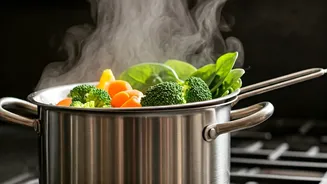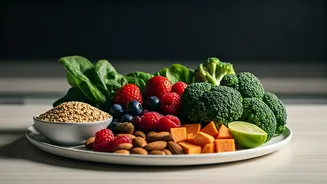Overcooking Vegetables
One prevalent error is overcooking vegetables. This can lead to significant nutrient loss, especially for water-soluble vitamins like vitamin C and B vitamins.
Prolonged exposure to heat causes these vitamins to break down. When boiling vegetables, some nutrients leach into the water, while high temperatures in methods like roasting or frying can also degrade them. To prevent this, consider steaming, stir-frying, or quickly blanching vegetables to preserve their nutritional value. These methods require less cooking time and retain more vitamins and minerals. The key is to maintain a crisp-tender texture, signaling that the vegetables are cooked but not overdone.
Using the Wrong Oils
Another frequent kitchen blunder involves improper use of cooking oils. Many people use oils with low smoke points at high temperatures, which can generate harmful compounds like free radicals and acrolein. Extra virgin olive oil, for instance, has a lower smoke point and is better suited for low to medium-heat cooking. On the other hand, oils with high smoke points like avocado or refined vegetable oils are ideal for frying and high-heat methods. Choosing the right oil ensures that your food retains its nutritional integrity. Consider the cooking method and select an oil with a suitable smoke point to avoid damaging the beneficial properties of your ingredients. Understanding these nuances makes a big difference in the health quotient of your meals.
Improper Food Storage
Incorrect food storage practices can degrade the nutritional value of your ingredients. Improper storage can result in loss of vitamins, especially in fresh produce. Exposing food to air, light, and fluctuating temperatures accelerates nutrient degradation. For example, storing fruits and vegetables at room temperature for extended periods can deplete their vitamin content. To counteract this, store produce in the refrigerator's crisper drawers to maintain freshness. Use airtight containers to store cooked food, preventing oxidation. Proper storage practices not only preserve nutrients but also extend the shelf life of your food, reducing waste and ensuring your meals remain healthful.
Over-Salting or Sugaring
Overuse of salt and sugar, even when cooking with nutritious ingredients, can compromise your health efforts. Excessive salt can lead to water retention, and sugar contributes to inflammation and can interfere with the body’s ability to absorb vitamins. High sodium intake can also increase the risk of hypertension, while excess sugar contributes to weight gain and blood sugar spikes. To mitigate these issues, reduce the amount of salt and sugar added during cooking. Experiment with herbs and spices to enhance the flavor of dishes naturally. Consider using alternative sweeteners in moderation, or try to reduce the overall sweetness of dishes to maintain the integrity of your meal's nutritional profile.
Microwaving Incorrectly
Microwaving food might seem convenient, but it can negatively impact nutrients if not done properly. Overheating food in the microwave can diminish the vitamin content. Ensure that you use microwave-safe containers and cover the food to allow for even cooking. Overcooking often happens when the food is heated for too long or at a high power setting. However, microwaving also has its advantages; it can preserve nutrients compared to some other cooking methods because it uses less water and shorter cooking times. When using a microwave, always follow the recommended cooking times. This method can be a fast way to enjoy a nutritious meal without diminishing its beneficial components.
Peeling Too Much
Peeling vegetables and fruits excessively can strip away essential nutrients. Many valuable nutrients, including fiber, vitamins, and minerals, are concentrated in the skin. The skins of apples, potatoes, and other produce are rich in antioxidants and other beneficial compounds. When you peel these ingredients, you remove the protective layer that holds many of these nutrients. To maximize nutrient intake, consider leaving the skin on where possible, after washing them thoroughly. If peeling is unavoidable, minimize the thickness of the peel. This simple adjustment ensures that you retain more of the valuable nutrients hidden just beneath the surface.
Improper Knife Techniques
The way you chop and prepare food also affects its nutrient content. Incorrect cutting methods can cause nutrients to leach out or be exposed to air, leading to degradation. Using a dull knife, for instance, can crush cells, causing nutrients to be lost. To maintain nutrient levels, use sharp knives for clean, efficient cuts. Avoid over-chopping, which can expose more surface area to air and cause nutrient loss. Aim for uniform cuts to ensure even cooking and nutrient retention. By employing these simple techniques, you can preserve the nutritional integrity of your ingredients and enhance your cooking experience.















